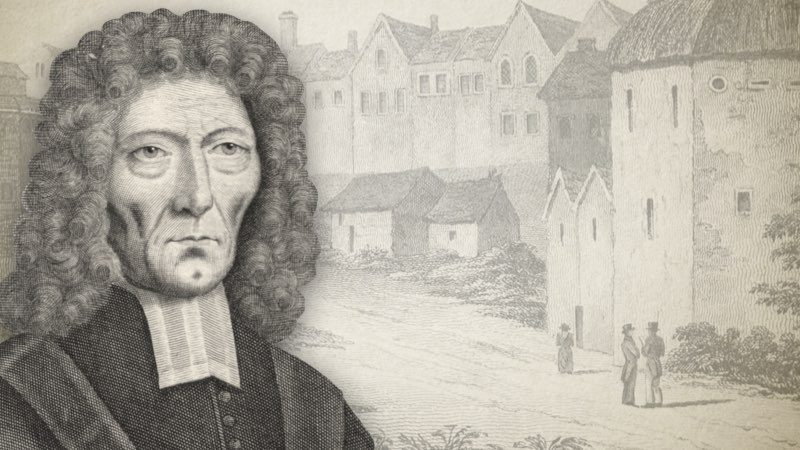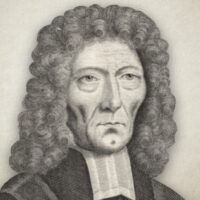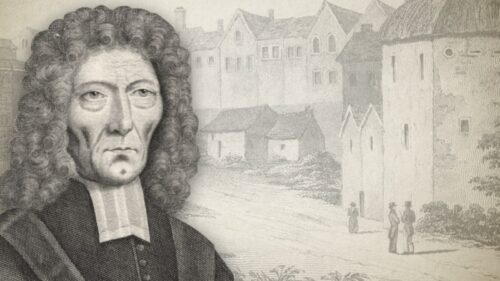
Introduction
The Everlasting Covenant, A Sweet Cordial for a drooping Soul: Or, The Blessed Nature Of The Covenant Of Grace Opened
Beloved,
The Solemn Occasion of this Assembly, may put us all in mind of our Mortality, Death is certain; all must die (as the Psalmist says) What Man is he that liveth and shall not see Death? Can he deliver his Soul from the Hand of the Grave? Ps 89:48.
Wicked Men die, so do the Godly, and as do the People, so do their Ministers, The Fathers, where are they? and the Prophets, do they live for ever? Yet there is a vast Difference between the Death of the Ungodly, and the Death of the Godly, &c. But to proceed, the Text I am to speak to, was left me by our Honoured Brother deceas’d, which shews the comfortable Hopes he had in Death, which is that in the 2 of Samuel 23:5. Although my House be not so with God, yet he hath made with me an everlasting Covenant, ordered on all things and sure: for this is all my Salvation, and all my Desire, although he make it not to grow.
My Text contains some of David’s dying Words, or Words which he uttered upon the near approach of his Death, see vers. 1. Now these be the last Words of David the Son of Jesse, and the Man who was raised up on high, the Anoin∣ted of the God of Jacob, and the sweet Psalmist of Israel. Tho’ it may be doubted, whether these Words, contained in the First verse, were uttered by David or not, but rather by the sacred Pen-man of this Book, yet the Words following, ’tis evident, were spoke by him, verse 2. The Spirit of the Lord spake by me, and his Word was in my Tongue. I utter not these Words (as if he should say) as by my own Spirit, but the Matter is dictated and given to me, by God’s Spirit, which is the great Teacher of his Prophets and People. vers. 3. The God of Israel said, the Rock of Israel spake to me; he that ruleth over Men must be Just, ruling in the Fear of God. Here are laid down the Two great and principal Parts of the Duty of Kings, and Supreme Rulers of People and Nations, Justice towards Men, and Piety towards God. vers. 4. And he shall be as the light of the morning, when the Sun riseth, even a morning without Clouds; as the tender Grass springing out of the Earth by clear shining after Rain. These Words may be applied to the Good and Righteous Government of any Godly King, &c. but chiefly, no doubt they contain a Prediction of the blessed Effects of the Reign and Kingdom of the Messias, of whom David (but more-especially Solomon his Son and his Peaceable Kingdom) was a Type or Figure of.
And thus I hasten in order to my Text, with what speed I well could. Although my House be not so with God; a little first by way of Explication: Although my House be not so with God, how is that? i. e. ‘Tis not as a Morning without Clouds, nor as the tender Grass springing out of the Earth, by clear shining after Rain; for my Morning (as if he should so say) has been over-cast, dark and dismal Clouds seem to attend my Kingdom, and my Children have not hitherto been like the tender Grass springing out of the Earth, by the sweet Influences of the Sun, and distillation of Rain, but rather like the Grass that withereth away, or is cut down before its due time: I have not so walked with God, as his infinite Mercies obligeth me to do; but have had many Weaknesses and Infirmities attending me, Yet he has made with me an everlasting Covenant. Tho’ I have broke Cove∣nant with God on my part, yet God will perform his Covenant with me, my Sins (as if he should so say) he hath pardoned, his Covenant is everlasting, on his part he will keep it, and the Messiah shall come of the Fruit of my Loins, whose Kingdom shall be as a Morning without Clouds, &c. And his Covenant with me he will not break, nor alter the thing that is gone out of his Mouth, see Ps 89:32,33,34. He intimateth, that his House or Family, God had not made to grow, increase, or flourish with that Glory, Peace and Prosperity, as he expected; nor had he such clear Evidences of God’s gracious Presences, and Communion with him in his Soul, as he might have had, had he not sinned, and grieved his Spirit; but tho’ it was thus, yet he saw he was in Covenant with God, and in an everlasting Covenant, ordered in all things, for God’s Glory, and for his eternal Good; and this was all his Hope, he foresaw Christ’s Blessed Day, with whom this Covenant stands fast, and this was all his Desire, my Soul only hath Comfort in this Covenant, and desires to build alone upon it: For it is (saith he) all my Salvation, I expect Salvation no other ways; ’tis not a part of it, but the whole of it from First to Last; here began my Hope, and here I stay my self, and will close my Days in the Faith of a dear Redeemer, that shall in due time be revealed, who is my Lord as well as he, shall be, according to the Flesh, my Son, or Off-spring, and this shall be accomplished, although it do not seem to grow, or but small Appearances are manifested as yet, either in me, or in my House or Family. In the Words are Three Parts.
1. Something supposed, (or taken for granted) wherein is implied David’s great Grief and Trouble, viz. Although my House be not so with God.
2. Something asserted, which signifies his Faith and Confidence in God, Yet he hath made with me an everlasting Covenant, ordered in all things and sure.
3. A comfortable Inference, or Conclusion from thence; for this is all my Salvation, and all my Desire, although he make it not to grow.
And from hence I shall observe Three Points of Doctrine,
1. Doct. That Darkness, Troubles, and Afflictions, with a decay of Grace, or spiritual Liveliness, may attend the State of Christians sometimes, while in his Life, which they cannot but acknowledge and mourn under the sight and sence of.
2. Doct. That God hath made with True Believers a blessed and well ordered Covenant.
3. Doct. That the Covenant of Grace which is made with Believers in Christ, is an everlasting Covenant, order’d in all things, and sure, and is the only Spring or Fountain of their Salvation, Hope, Desire and Consolation, both in Life and Death.
It is the last Proposition or Point of Doctrine I shall now Prosecute, (judging it may most fitly Answer that which was the chief Design and end of our Honoured Brother deceas’d, in choosing this Text to be opened at his Funeral, from whence he doubtless found so much Comfort under those grievous Afflictions and Trials in his Life, and also at the time of his Death)
Four Things I purpose to do.
First, Shew you what this Covenant is, and with whom it was primarily made, and for whom.
Secondly, Open the Excellent Nature of the Covenant of Grace.
Thirdly, Shew how all a Believer’s Salvation, Hope, Desire and Consolation in Life and Death, lies in this Covenant.
Fourthly, Shall make some Application of it.
Benjamin Keach (1640-1704) was a Particular Baptist pastor and prolific writer. He was converted to Christ in his youth and in 1659 began to preach the gospel under the auspices of a free will Baptist church in Buckinghamshire. In 1664, he was arrested on charges of publishing a schismatical catechism for children. He was sentenced to two weeks’ imprisonment, fined twenty pounds and pilloried for several hours in Aylesbury and Winslow. In 1668, he moved to London and was appointed the Pastor at the Horsleydown congregation in Southwark. Having now come into contact with several Particular Baptist ministers, he began to nurture Calvinistic views of the gospel, becoming one of the leading Particular Baptist ministers in London. He served thirty-six years as the Pastor for the Horsleydown church, was one of the signers of the 1689 Second London Baptist Confession of Faith and was the author of more than forty books.
Benjamin Keach on the Everlasting Covenant (Complete)




